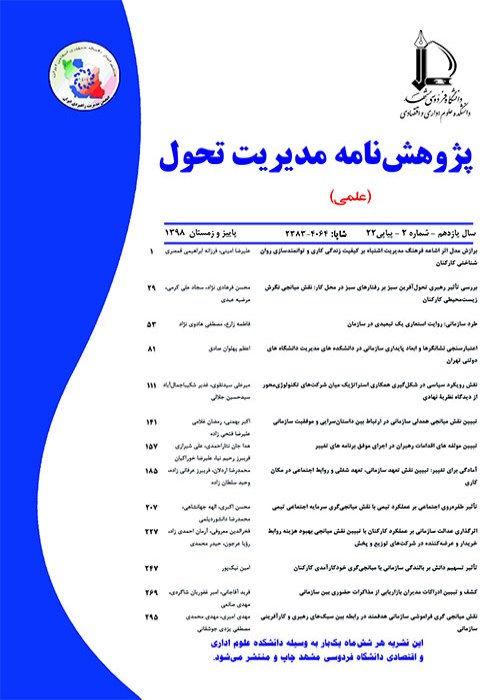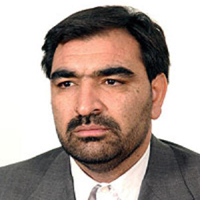DesigningAgent-Based Modeling in Process Performance Measurement
Author(s):
Article Type:
Research/Original Article (دارای رتبه معتبر)
Abstract:
INTRODUCTION
Business process improvement for promoting product quality has continuous importance in every industry. Every organization should measure, control and analyze its performance. Therefore, the assessment and management of performance is considered as an important strategic process which is affected by various environmental and organizational factors. Management and performance assessment have been considered as critical tools to manage an organization and in order to survive and develop in a competitive environment, organizations require their own assessment and management performance system. Various performance measurement models have been designed and elaborated from the past to the present and each one has specific features. Regarding environmental complexities and competitive environments, it is necessary to design a process performance measurement model with new smart technological features for organizational needs.
THEORETICAL FRAMEWORK:Different methodologies and models have been provided in the management literature for the management of performance processes. Performance management can focus on the performance of an organization, a department, process and employee. In this research, based on the literature review, the interaction effect of process performance measurement model, intelligence agents, and process model were investigated. In this article, theoretical basis are examined in three categories (i.e., performance measurement model, intelligence agents, and process model). In terms of performance measurement model, some models from past to present were considered. In this group, more than thirty different models were studied. Regarding intelligence agents, their features and functions were considered. Intelligence agent’s technology has been used in various fields such as manufacturing, process control, communications, transportation systems, SCM, knowledge management, etc. The feature and characteristics of an agent depend on application and its target. Accordingly, some of their common features are as follows: Autonomy, mobility, adaptability, collaborate with others, and reliability. Moreover, in the category of process model, the most important and relevant process model was considered. In this group, process reference model and frameworks as APQC, Value Chain, SCOR, 6Sigma and others were studied.
METHODOLOGY
In this research, based on the literature review, the interaction effect of process performance measurement and intelligence agent were studied, and agent-based modeling in process performance measurement was presented. In this article, data was gathered from literature review and some documents. Experts’ opinions have also been used to design and evaluate the model. In addition, to obtain the opinion of experts, the Delphi method was used in two panels. Interviews with experts were used in order to elicit general organization knowledge and to acquire tacit knowledge related to design of model. Then, in order to design the agent-based model, RUP and UML techniques were used.
RESULTS and DISCUSSION:
In this paper, based on the literature review and experts opinions, the design of agent-based modeling in process performance measurement was presented. The model designed has three layers; the first layer has five steps (i.e., define, measurement, analysis, improvement and control); the second layer includes intelligence agents and the last layer consists of databases and a process model. Agent-based architecture has been considered in the presented model and some agents were defined in this model as definer, reporter, recommender, processer and observer. In this research RUP and UML techniques were used for architecture of agents. In addition, experts were asked to evaluate the model with Delphi methodology in two panels.
CONCLUSIONS and SUGGESTIONS:
The research findings are in harmony with the aim of the research proposing an agent based conceptual model of process performance measurement with specified and categorized results. This model was designed in three layers, the first layer has five steps, and each step involves specified activities and is related to certain agents. The second layer includes some agents and the last layer consists of databases and reports. In this research, in order to design the optimal agent-based modeling, we tried to use the RUP method and language of UML modeling; hence, the results shown as user diagrams, activity charts, and class diagrams are all related to the agents. A future study would also aim to develop an agent-based modeling in performance measurement systems, and implement the agent-based model for pilot studies in organizations. It is hoped that the findings of this research suggest an adequate level of interest in both process performance and business intelligence in the field of agents, and encourage further investigation to address process performance using intelligence agent techniques, as discussed in this paper.Keywords:
Language:
Persian
Published:
Transformation Managemet Journal, Volume:9 Issue: 2, 2018
Pages:
66 to 89
magiran.com/p1907215
دانلود و مطالعه متن این مقاله با یکی از روشهای زیر امکان پذیر است:
اشتراک شخصی
با عضویت و پرداخت آنلاین حق اشتراک یکساله به مبلغ 1,390,000ريال میتوانید 70 عنوان مطلب دانلود کنید!
اشتراک سازمانی
به کتابخانه دانشگاه یا محل کار خود پیشنهاد کنید تا اشتراک سازمانی این پایگاه را برای دسترسی نامحدود همه کاربران به متن مطالب تهیه نمایند!
توجه!
- حق عضویت دریافتی صرف حمایت از نشریات عضو و نگهداری، تکمیل و توسعه مگیران میشود.
- پرداخت حق اشتراک و دانلود مقالات اجازه بازنشر آن در سایر رسانههای چاپی و دیجیتال را به کاربر نمیدهد.
In order to view content subscription is required
Personal subscription
Subscribe magiran.com for 70 € euros via PayPal and download 70 articles during a year.
Organization subscription
Please contact us to subscribe your university or library for unlimited access!




